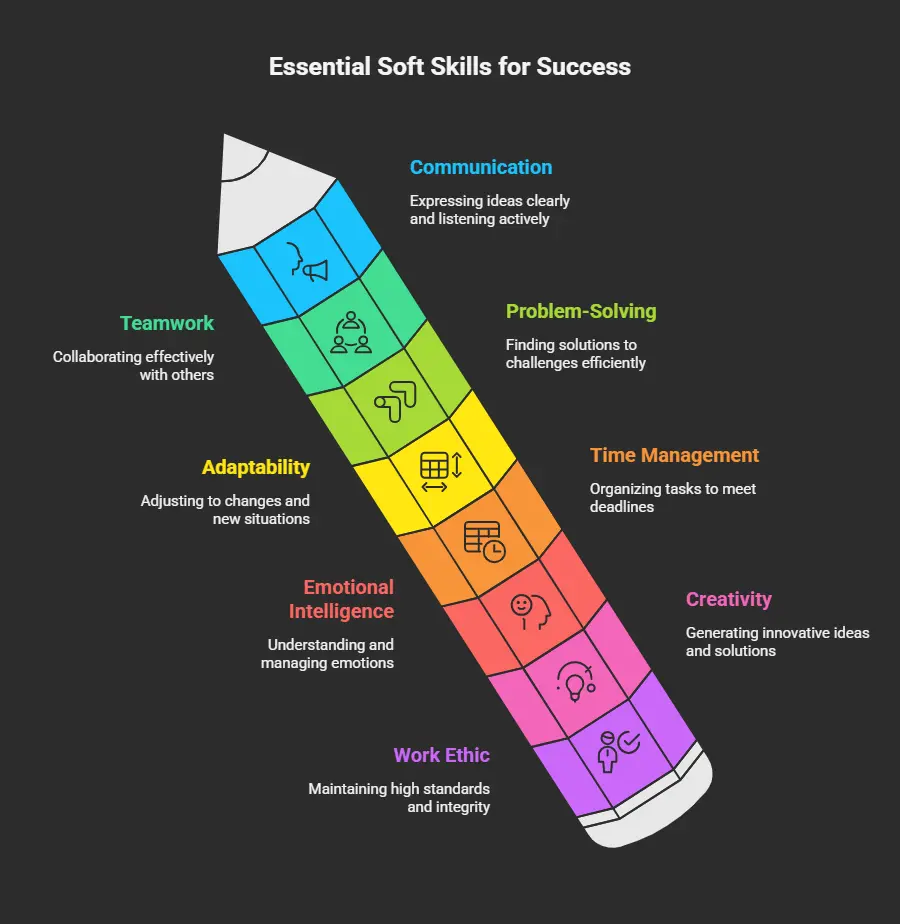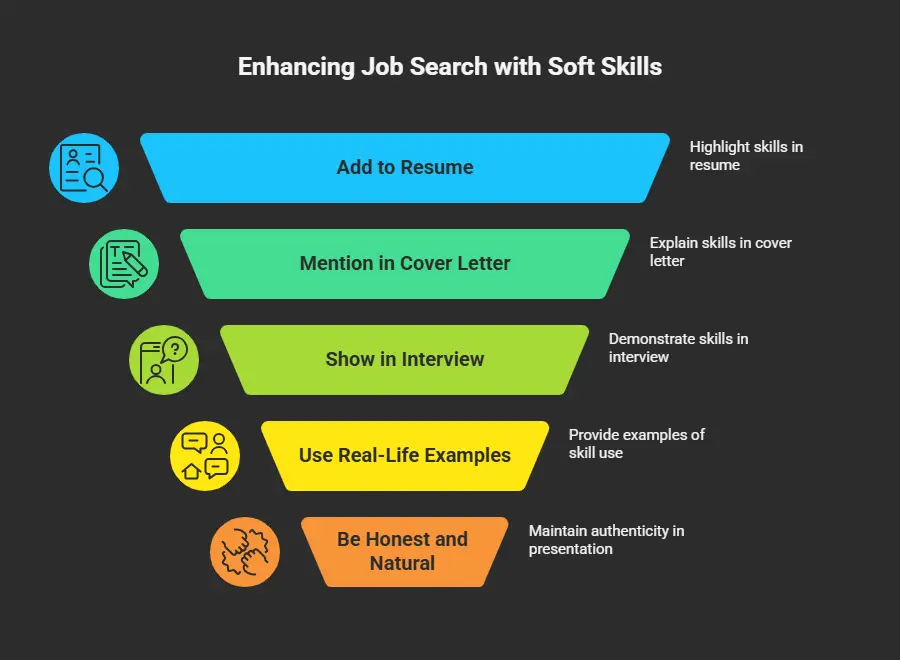Table of Contents
Landing your dream job is not just about having the right qualifications or any specialized skills—it is also about how well you connect with people, adjust to new challenges, and present yourself in a group. These basic qualities are known as soft skills, and they can make all the contrast in your job search.
Every employer looks for candidates who can communicate clearly, work well in teams, solve issues inventively, and handle hectic problems with a positive attitude. Whether you are writing a resume, preparing for an interview, or managing the work environment, moreover strong soft skills set you seperated from the competition. In this blog, we will explore the most in-demand soft skills for job searchers, and real-life examples to help you showcase them successfully.
Begin Your Personality Transformation- Enroll Today!
What Are Soft Skills?
The soft skills are personal characteristics, habits, and technical proficiencies that determine how you work with others, handle challenges, and navigate the professional environment. Unlike hard skills, soft skills focus more on how you work instead of what you know.
These skills affect your communication style, problem-solving, teamwork, adaptability, and emotional intelligence. Although hard skills can land you an interview, soft skills often determine what you achieve and how you perform .
Why Are Soft Skills Important?
Soft skills are essential in today’s workplace because they directly influence how individuals interact, communicate, and work with others. Unlike technical skills, which relate to specific job functions, soft skills are universal and transferable across roles and industries. Employers value them highly because they improve teamwork and foster stronger collaboration among employees. Strong communication, emotional intelligence, and active listening help create smoother workflows, reduce misunderstandings, and build stronger relationships with both colleagues and clients.
In addition, soft skills enhance an employee’s ability to adapt in fast-changing work environments. Skills like problem-solving, flexibility, and critical thinking make it easier to handle challenges without becoming overwhelmed. Leadership and decision-making abilities are also rooted in soft skills, helping individuals guide teams, resolve conflicts, and make thoughtful, informed choices. Ultimately, soft skills contribute not only to individual success but also to the overall performance and culture of an organization.
Each and every employers highly value soft skills because they:
-
Improve teamwork and collaboration.
-
Increase communication with colleagues and clients.
-
Help solve problems effectively.
-
Increase flexibility in changing work environments.
-
Promote leadership and decision-making abilities.
Examples of Soft Skills
Soft skills are personal quality and behaviors that help you work well with others and succeed in every job. Unlike technical skills (such as coding or accounting), soft skills are about how to interact, solve problems and adapt to different situations. Here are some of the most important soft skills that help them better understand with real-life examples:
1. Communication
- The capability to express ideas clearly, listen actively and modify your message for different target groups (written, verbal, or non-verbal).
- Miscommunication causes errors, delays and issues at work. Good communicators keep teams orient and run projects smoothly.
Examples:
- To write a clear and professional email for a customer.
- To present an idea in a meeting without confusing people.
- To listen carefully when a colleague explains a problem.
2. Teamwork
- Works well with others, respects different ideas from the team members and contributes to the success of the group.
- Most jobs require collaboration. Employers want people who help-don’t hinder their team.
Examples:
-
Support a struggling teammate rather than blaming them.
-
You should compromise when there is a disagreement on a project.
-
Celebrate entire team wins instead of taking all the credit for yourself.
3. Problem-Solving
Those who can solve problems in a quick manner are highly valued by employers. This can use industry expertise to solve a problem as it occurs or takes time for analysis and team consultation to identify a long -term scalable solution.
Examples:
-
Fixing a setup issues without missing a deadline.
-
Finding a new tool when the old system fails.
-
Converse creative ways to save the company money.
4. Adaptability
If you work in a technology -driven field or start -up environment, adaptability for success is an important skill. In such roles, changes in procedures, equipment or even customers you support can be faster. Employees who can meet the developed conditions and embrace new ways of working are considered valuable in many industries. This level of flexibility helps with team harmony, promotes positive relationships with colleagues and contributes to a flexible working environment. Some related adaptability is:
- Consistency
- Organisation
- Optimism
- Flexibility
Examples:
-
Learning a new software quickly when the company upgrades.
-
Staying calm when a project direction suddenly shifts.
-
Taking on extra tasks when a coworker is out sick.
5. Time Management
- Organizing tasks efficiently to meet deadlines without rushing or burning out.
- Poor time management leads to missed deadlines and stressed teams.
Examples:
-
Breaking a big project into smaller steps to avoid last-minute panic.
-
Using a calendar to block time for important tasks.
-
Politely saying “no” to extra work when your plate is full.
6. Emotional Intelligence (EQ)
- Understanding emotions of your team members and others, also you should appropriately.
- High EQ reduces issues in every firm, improves entire teamwork, and creates a positive work atmosphere.
Examples:
-
You should stay calm when receiving negative feedback.
-
If you noticed your coworker seems stressed, then should offer help.
-
Avoid gossiping office mates that could hurt their feelings.
7. Creativity
Creativity is a broader ability that covers a series of soft skills and technical skills. Employees who demonstrate creativity are often able to complete tasks with significant thinking, discover new methods to improve existing processes or develop new solutions that may benefit the broader task environment. This skill is not limited to a specific role or level. In different professional surroundings, creativity is very valuable in departments and industries that support problems with problems-solving and adaptation. Here are some related creativity skills:
- Curiosity
- Learning from others
- Open-mindedness
- Taking calculated risks
Examples:
-
Training a newly hired team member patiently instead of getting frustrated.
-
Stepping up to lead a project when no one else as team leader.
-
You should encourage your teammates during tough time.
8. Work Ethic
The function refers to work ethic stability and ability to meet tasks and responsibilities with high standards. Performing a strong work ethic can help you have a positive relationship with your employer and colleagues, even if you still get technical skills in a new role. Many recruits and leaders who are at work prefer candidates who show a desire to embrace continuously instead of a person with competence, who lack inspiration or mutual skills. Here are some important related work ethic skills:
- Attention to detail
- Integrity
- Persistence
- Time management
Examples:
-
Showing up on time and meeting deadlines without reminders.
-
Double-checking your work for errors before submitting it.
-
Taking initiative to improve a process instead of waiting for instructions.
Boost Your Skills & Kickstart Your Career!
Employability and Personality Development Course by Entri App: Enhance your communication, confidence, and job-ready skills to excel in your career.
Join Now!How to improve your Soft Skills
It begins with the betterment of your soft skills. Work on speaking clearly, listening attentively and using polite terms when in day to day surroundings. Good communication is what helps you express yourself well and listen to others in a better way. One other soft skill that’s valuable is the ability to work with others — find a way to be good to others by being respectful and supportive, while also being open to the opinions and ideas of others. The best possible team player that you can be is a more reliable, easier person to work with.
1. You should practice continuously
If you practice it, you can improve any soft skills. Most of these are a case of routine. For example, you can practice dependence on both jobs and at home, by improving the time limit (to show work or events time or early) and at home so you can complete them before the plan.
Consistency is key when building soft skills. Like learning an instrument or sport, small daily actions lead to gradual improvement. Whether it’s practicing clear communication during meetings or showing empathy in conversations, every effort adds up. You’ll start noticing positive changes not only in how others perceive you, but in how confident and capable you feel in different environments.
2. You learn and observe from others
Many of these qualities can be developed by looking at others who succeed in their roles. You can inspect and learn from such professionals and integrate these skills into your routine. For example, you can improve your time management, time or in time for work and events, and to fulfill advance projects to complete them before your plan and strengthen your addiction at home. Such habits reflect a strong task moral and help to strengthen your value as a team player ready to adapt and learn.
Pay attention to how effective communicators express themselves or how skilled leaders handle pressure. Mimicking these behaviors and applying them to your own experiences can accelerate your growth. Shadowing a mentor or asking for feedback from colleagues can also give you valuable insight into areas for improvement. The key is to stay open and curious, using every interaction as a learning opportunity.
3. Should set goals for your skills
This can help determine the goals by reading the reviews of your performance carefully or by reading carefully for creative criticism. This can help you identify the most important areas of reforms for goals and strength to highlight the CV and highlight in the interview. You can prioritize which soft skills will work on the basis of the ones you need to get a certain job, or you have to get ahead in your existing career.
Make your goals measurable and realistic. For example, if your goal is to become a better listener, commit to asking more questions in meetings or summarizing what others have said before responding. Track your progress over weeks or months to stay motivated. Setting goals gives your efforts direction and ensures that your development is intentional, not accidental.
4. Search for relevant resources
Different types of resources are available to improve specific soft skills, including books, podcasts and online courses. Although some may require payment, many costs and available are in simplicity. You may want to find out many formats to find out which one is best in your learning style. Whether you focus on communication skills, emotional intelligence, conflict management or leadership skills, these tools can support your progress in developing soft skills in demand in the modern workplace.
You can also join local workshops, online forums, or professional groups where soft skills are discussed and practiced. Engaging in communities where personal growth is encouraged helps reinforce your learning and keeps you accountable. Don’t underestimate the value of real-world practice alongside educational materials. Combining both leads to deeper understanding and practical application.
How to highlight Soft Skills during a Job Search
It is important as showing technical or job-specific abilities to highlight your soft skills during job searching. For a new beginning, you need to include your soft skills such as communication, teamwork, time management or problem-solving in the CV. Instead of just listing each of them, try to provide small examples of how to use these skills in your projects. Instead of writing as “Good at team work”, you should say “Worked with a team of five to complete a project before the deadline.”
In a job interview you can show your soft skills through your behavior. Talk honestly, listen carefully, and be calm and humble. Share real stories from your experiences showing how to handle a challenging situation, worked in a team or solved a problem. In addition, you can refer to soft skills in your cover letter how they helped you succeed in previous roles. By providing simple examples and reassuring, you can have the best effect and feel the employer that you are very suitable for this role and team.
How To Highlight Your Soft Skills?
Showing your soft skills can be very beneficial during your job search. If you actively require work, you can resume your soft skills and use the cover letter.
✅Add Soft Skills to Your Resume
When the skills to include, consider the special job details and competences you can be confirmed by your references. Abilities such as problem solving, time management, communication skills or data analysis can be highlighted, can improve your visibility with recruitment and employer can coordinate your application with expectations.
Example:
Include Technical skills like : Learning technology
- Mac OS
- Windows OS
- Blackboard
In additional skills like : Strong communication skills
- Empathic
- Passionate and motivated
✅ Mention Them in Your Cover Letter
Your cover letter involves at least a well-developed and relevant soft skills that indicates why you fit the job well. You can explain how your soft skills match the company’s goals, values and assignments.
Example: “In my previous role, I showed both passion and creativity that was highly assessed by my colleagues and my leaders. For example, I successfully proposed a team together to work on a marketing campaign aimed at a young demographic for our product. From beginning to end, my team members and leaders praised my ability to work positively with my team to help establish a new interest in our company.”
✅Show Them During the Interview
In an interview of a job, your soft skills should get into the way you talk and hear. Talk clearly, be humble and show confidence. Share real examples of how you used your soft skills at work.
✅Use Real-Life Examples
Just don’t say you have soft skills – what to do them. Share small stories about working in a team, solving a problem or pressure. The real examples make your skills more reliable.
✅Be Honest and Natural
Be yourself. Don’t try to show off. Honestly talk how to work with others, how to remain calm under pressure, or how to take feedback. Employers appreciate honest and confident candidates.
Begin Your Personality Transformation- Enroll Today!
Conclusion
Soft skills are important as technical skills in search of jobs. They help you do good work with others, solve problems, manage your time and communicate clearly. Employers want people who are not only good in their jobs, but also easy to work together. The best way to show your soft skills is through CV, cover letters and real life examples in interviews. When you are honest, confident and positive, you can create a strong impression and show that you are ready to become a member of a great team. With practice and effort, anyone can improve their soft skills and increase the chances of hiring.
| Related Links | |
| Top Communication Skills For A Resume | What Does a Group Leader Do? |
Boost Your Skills & Kickstart Your Career!
Employability and Personality Development Course by Entri App: Enhance your communication, confidence, and job-ready skills to excel in your career.
Join Now!Frequently Asked Questions
What are soft skills?
Soft skills are personal qualities that help you work well with others. They include communication, teamwork, time management, problem-solving, adaptability, and emotional intelligence. These skills are important in every job, no matter the industry.
Why are soft skills important for job seekers?
Soft skills help you get along with coworkers, handle stress, stay organized, and communicate clearly. Employers look for these skills because they show how well you can work in a team, solve problems, and adjust to new situations.
How can I show soft skills in my resume?
Instead of just listing soft skills, include real examples of how you used them. For example, write, “Worked with a team to complete a group project before the deadline” to show teamwork and time management skills.
What are some common soft skills employers look for?
Some of the most wanted soft skills include good communication, teamwork, problem-solving, time management, adaptability, and leadership. These skills help create a positive and productive work environment.
Can soft skills be learned or improved?
Yes! Soft skills can be developed through practice, self-awareness, and feedback. You can improve by joining group activities, attending workshops, volunteering, or working on real-world tasks that require teamwork and communication.
How do I talk about my soft skills in a job interview?
In an interview, give real examples to show your soft skills. For instance, if asked about a challenge, you can explain how you solved it using clear communication or teamwork. Speak confidently and politely to show your skills naturally.













